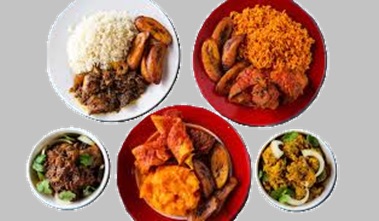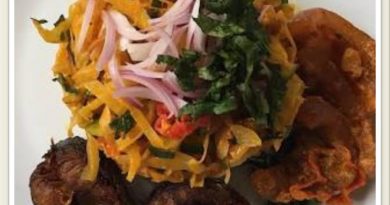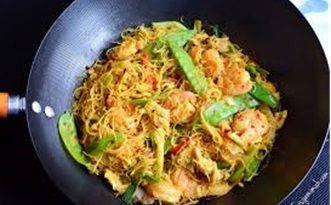Cuisine in Nigeria &Food Culture: A Guide on Recipes &Traditions
Cuisine in Nigeria & Food Culture: A Guide on Recipes &Traditions
Nigeria is a vibrant West African nation with over 350 ethnic groups, each contributing to the country’s rich culinary diversity.
Please read: https://9jafoods.com/210-nigerian-foodstuffs-and-ingredients-prices-list/

From the spicy aroma of Suya on the streets of Lagos to the hearty comfort of Edikaikong soup in Calabar, Nigerian food is more than just a meal; it’s a cultural experience.
In this guide, we will explore Nigeria food, the history of cuisine in Nigeria, popular Nigerian food recipes, the national food dish of Nigeria, and unique customs that make Nigerian dining special.
Cuisine in Nigeria: A Blend of Diversity
Cuisine in Nigeria is a vibrant blend of flavors, ingredients, and traditions shaped by over 350 ethnic groups.
It features hearty staples like yam, cassava, rice, beans, plantain, and maize, paired with rich soups, stews, and sauces seasoned with peppers, onions, ginger, and native spices.
Each region has its specialties. Yoruba cuisine is known for Amala and Ewedu, Igbo cuisine for Ofe Oha and Abacha, and Hausa-Fulani cuisine for Tuwo Shinkafa and Fura de Nunu.
Popular nationwide dishes include Jollof Rice, Egusi Soup, Pounded Yam, and Suya.
Nigerian cuisine is not just about food; it’s a cultural expression, often shared at family gatherings, celebrations, and festivals, making it an essential part of the country’s identity.
Nigeria Food: A Cultural Treasure
Nigeria food reflects the nation’s history, climate, and agricultural abundance.
Staple ingredients like yam, cassava, rice, plantain, beans, maize, and various vegetables are transformed into colorful, flavorful dishes.
The flavors are bold, often seasoned with peppers, onions, ginger, garlic, and native spices.
Nigerian meals are known for their rich taste and generous portions, with soups, stews, and sauces taking center stage.
Mealtimes are often social, bringing families and communities together.
Nigeria Food Recipes: From Kitchen to Table
Nigerian recipes often focus on building deep flavors with fresh ingredients and slow cooking methods.
Popular Nigeria food recipes include:
- Jollof Rice – A smoky, tomato-based rice dish beloved across West Africa.
- Egusi Soup – Made from melon seeds, leafy vegetables, and assorted meats.
- Pounded Yam with Nsala Soup – A soft, stretchy staple paired with spicy white soup.
- Moi Moi – A steamed bean pudding made from blended beans, peppers, and spices.
- Suya – Street-style spicy skewered beef, grilled to perfection.
Most recipes involve layering flavors, starting with a fried pepper base (ata lilo) before adding proteins and vegetables.
Nigerian Foods: Everyday Meals and Special Occasions
In Nigerian homes, food is not just nourishment—it’s hospitality. Guests are almost always offered a plate, and festivals are incomplete without traditional dishes.
- Breakfast might include Akara (bean cakes) or Yam Porridge.
- Lunch often features rice dishes or swallow with soup.
- Dinner can be lighter but still flavorful, such as Plantain and Beans Pottage.
Special occasions like weddings, naming ceremonies, and Christmas feature lavish spreads of Nigerian foods such as Pepper Soup, Banga Soup, and Jollof Rice with Grilled Chicken.
Popular Food in Nigeria
Some foods have earned iconic status across the country:
- Jollof Rice – A must-have at parties.
- Pounded Yam – Often eaten with Egusi or Vegetable Soup.
- Eba – Made from garri (cassava flakes) and paired with soups.
- Suya – The ultimate Nigerian street food.
- Moi Moi – A healthy, protein-rich side dish.
These dishes are enjoyed by all tribes, making them true staples of popular food in Nigeria.
National Food Dish of Nigeria
While Nigeria doesn’t have an officially declared national dish, Jollof Rice is widely considered the country’s culinary ambassador.
Its smoky flavor, vibrant red color, and party appeal make it a national favorite. Other contenders for this title include Pounded Yam with Egusi Soup and Suya.

Nigerian Food Customs and Traditions
Food in Nigeria comes with traditions that reflect respect, cleanliness, and community values. Some long-standing customs include:
- Washing hands before eating – Especially important when eating with the hands.
- Respecting elders during meals – Younger people wait for elders to take meat or fish first.
- Women as primary cooks – Traditionally, women prepare meals, though modern households may share duties.
- Covering hair while cooking – Ensures hygiene.
- Avoiding talking while eating – Reduces the risk of choking, especially with spicy food.
While modern life has changed some of these customs, they remain an important part of Nigerian food culture.
Modern Influence on Nigerian Cuisine
Globalization has brought new cooking techniques and fusion recipes to Nigeria.
However, traditional meals remain deeply rooted in family life. Nigerians abroad also recreate these dishes, preserving their heritage and introducing them to international audiences.
Cuisine in Nigeria: The Bottom Line
The beauty of Nigerian food lies in its diversity, bold flavors, and deep cultural significance.
Whether you’re enjoying a plate of Jollof Rice at a wedding or savoring Tuwo Shinkafa in the north, each bite tells a story of tradition, community, and pride.
From popular food in Nigeria to the rich cuisine in Nigeria, this culinary heritage continues to inspire both home cooks and professional chefs around the world.


